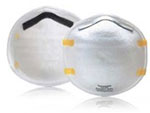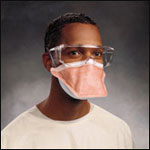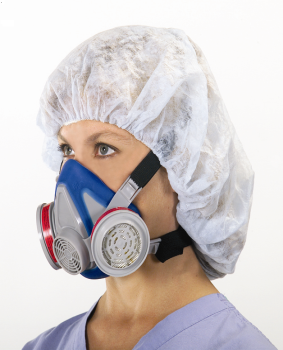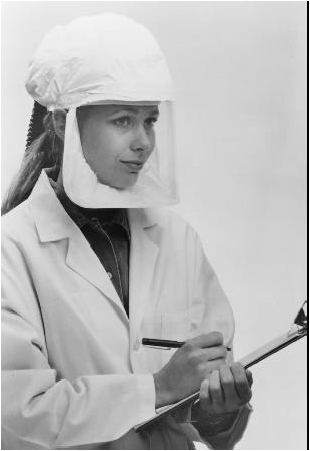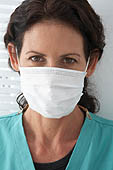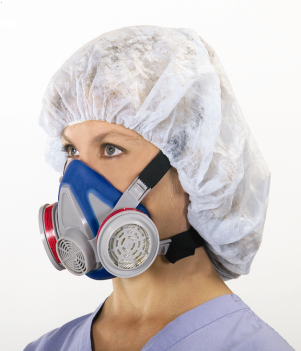3 Healthcare Workers Primary Hazard Module
Survey of Healthcare Workers' Health and Safety Practices
Attachment I2_Module A_FINAL_08042010
Healthcare Workers Primary Hazard Module
OMB: 0920-0860
MODULE A: Aerosolized Medications Form Approved
7/23/10 OMB No. 10AP-XXXX
Expiration Date: XX/XX/2011
PROGRAMMING INSTRUCTIONS APPEAR IN BLUE.
If Respondent marked ‘YES’ to ONE OF THE intro QuestionS, go to appropriate sUBMODULE.
IF Respondent marked ‘YES’ to two intro QuestionS, RANDOMIZE ORDER that the SUBMODULES ARE PRESENTED.
if respondent marked ‘yes’ to all three intro questions, present submodule B either first or last [due to different time period (30 days) for pentamidine] and randomize order of A and C.
INTRO QUESTIONS |
|
|||||||
A. |
Did you administer the aerosolized antibiotics tobramycin (TOBIR), amikacin (AmikinR) and/or colistin in the past 7 calendar days? display a calendar highlighting the
past
7 calendar days. Applies to all questions with ‘in the
past 7 or 30 calendar days’
|
|
|
|
||||
|
|
|||||||
B. |
Did you administer aerosolized pentamidine (NebupentR) in the past 30 calendar days? display calendar highlighting the past 30 calendar days |
|
|
|
||||
|
|
|||||||
C. |
Did you administer aerosolized ribavirin (VirazoleR) in the past 7 calendar days? display calendar highlighting the past 7 calendar days. |
|
|
|
||||
|
|
|||||||
Submodule 1: Aerosolized Antibiotics Tobramycin, Amikacin and Colistin |
|
|||||||
1. |
During your career, how long have you been administering the aerosolized antibiotics tobramycin (TOBIR), amikacin (AmikinR) or colistin? |
|
|
|
||||
|
|
|||||||
2. |
When was the last time you received training on procedures for the safe handling of these three aerosolized antibiotics?
|
|
|
|
||||
If you work for more than one employer, the following questions apply to your primary employer, i.e., the one for which you typically work the most hours. If you are self-employed, consider yourself the employer.
|
|
|||||||
3. |
Does your employer have standard procedures for administering the aerosolized antibiotics tobramycin, amikacin or colistin? |
|
|
|
||||
|
|
|||||||
4. |
During the past 7 calendar days, on how many days did you administer the aerosolized antibiotics tobramycin, amikacin or colistin?
|
|
|
|
||||
|
|
|||||||
During the past 7 calendar days, what was the total number of times you administered any of these three aerosolized antibiotics?
Note: If you administered any of these three aerosolized antibiotics more than one time to the same patient, count each administration separately.
|
|
|
|
|||||
|
|
|||||||
6. |
During the past 7 calendar days, did you administer any of these three aerosolized antibiotics…
|
|
|
|
||||
|
|
|||||||
7. |
During the past 7 calendar days, how much time did you typically spend with a patient during a single administration of the aerosolized antibiotics tobramycin, amikacin or colistin?
Note:Include
medication preparation time, delivery time spent with patient, and
clean-up time where you continue to be exposed. Exclude time spent with the patient in pre-administration assessment or any other times in the process where you are not exposed.
|
|
|
|||||
|
|
|||||||
|
||||||||||||||||
During the past 7 calendar days, in which of the following areas did you administer the aerosolized antibiotics tobramycin, amikacin or colistin? Please all that apply.
|
|
|
||||||||||||||
If only one area in Question 8 è Go to Question 10. |
||||||||||||||||
|
||||||||||||||||
Of the locations you checked above, please indicate the area where you most often administered these three aerosolized antibiotics during the past 7 calendar days.
|
|
list areas marked in Question 8 (USE RADIO BUTTONS)
|
||||||||||||||
IF Respondent MARKED ‘1 TIME’ IN QUESTION 5 è Go to Question 10. If Respondent marked any of the other responses in QUESTION 5 è Go to Question 11. |
||||||||||||||||
10.
|
When you administered the aerosolized antibiotics tobramycin, amikacin or colistin to patients during the past 7 calendar days, did you … |
|
Yes |
No |
||||||||||||
a) ….use a continuous aerosol delivery system attached to a face mask, face tent or tracheostomy collar?
|
|
|
|
|
||||||||||||
b)…..use a hand-held, continuous aerosol delivery system (nebulizer, T-piece, mouth piece) with an expiratory filter?
|
|
|
|
|
||||||||||||
c)…..use a ventilator equipped with an expiratory high efficiency particulate air (HEPA) filter?
|
|
|
|
|
||||||||||||
d)…..administer the medication(s) in a negative pressure room (NPR) (i.e., air flows from adjacent areas into the NPR, ensuring that contaminated air cannot escape from the NPR to other areas)?
|
|
|
|
|
||||||||||||
ALL RESPONSES è Go to Question 12. |
||||||||||||||||
When you administered the aerosolized antibiotics tobramycin, amikacin or colistin to patients during the past 7 calendar days, how often did you…
|
Every time |
Sometimes |
Never |
|||||||||||||
a) ….use a continuous aerosol delivery system attached to a face mask, face tent or tracheostomy collar? |
|
|
|
|||||||||||||
b)…..use a hand-held, continuous aerosol delivery system (nebulizer, T-piece, mouth piece) with an expiratory filter? |
|
|
|
|||||||||||||
c)…..use a ventilator equipped with an expiratory high efficiency particulate air (HEPA) filter? |
|
|
|
|||||||||||||
d)…..administer the medication(s) in a negative pressure room (NPR) (i.e., air flows from adjacent areas into the NPR, ensuring that contaminated air cannot escape from the NPR to other areas)? |
|
|
|
|||||||||||||
|
||||||||||||||||
12. |
Has exposure monitoring (e.g., air sampling, surface wipe sampling) been conducted in the past 12 months to assess your or your co-workers’ exposure to…..…
|
Yes |
No |
I don’t know |
||||||||||||
tobramycin? |
|
|
|
|||||||||||||
colistin? |
|
|
|
|||||||||||||
|
||||||||||||||||
Questions addressing work practices and use of personal protective clothing and equipment will help us understand what is currently used and under what circumstances. Depending on your job and exposures, these may not be required.
|
||||
13. |
During the past 7 calendar days, how often did you wear a water resistant gown or outer garment while administering aerosolized tobramycin, amikacin or colistin?
|
|
|
|
|
||||
What were the reason(s) you did not always wear a water resistant gown or outer garment while administering aerosolized tobramycin, amikacin or colistin? Please all that apply.
|
|
|
||
If only one reason in Question 14 è Go to Question 16. |
||||
|
||||
Of the reasons you checked above, please indicate the most important reason you did not always wear a water resistant gown or outer garment while administering any of these three aerosolized antibiotics. |
|
list reasons marked in Question 14 (use radio buttons)
|
||
In your current job, have you taken home any clothing that came into contact with tobramycin, amikacin or colistin? |
|
|
|
|
|||
17. |
During the past 7 calendar days, how often did you wear protective gloves while administering aerosolized tobramycin, amikacin or colistin? |
|
|
|
|||
What were the reason(s) you did not always wear protective gloves while administering these three aerosolized antibiotics? Please all that apply.
|
|
|
|
If only one reason marked in Question 18 AND “NEVER” IN QUESTION 17 è Go to QUESTION 22 IF ONLY ONE REason marked IN QUESTION 18 AND “SOMETIMES”IN QUESTION 17 èGO TO QUESTION 20 |
|||
|
|||
Of the reasons you checked above, please indicate the most important reason you did not always wear protective gloves while administering these three aerosolized antibiotics. |
|
list reasons marked in Questions 18 (use radio buttons)
|
|
if “NEVER” in question 17 è Go to Question 22 |
|||
|
|||
20. |
During the past 7 calendar days, did you perform any of the following activities while wearing protective gloves that had been used during the handling of tobramycin, amikacin or colistin? |
Yes
|
No
|
|||||
a. Use phone/ cell phone/pager |
|
|
||||||
b.
Touch a computer keyboard, mouse, |
|
|
||||||
c. Handle files or charts |
|
|
||||||
d. Touch door knobs, cabinets or drawers |
|
|
||||||
e. Eat, drink, chew gum or smoke |
|
|
||||||
f. Use pen or pencil |
|
|
||||||
g. Touch waste basket/garbage bags |
|
|
||||||
h. Use restroom |
|
|
||||||
i. Apply cosmetics (e.g., lip balm) |
|
|
||||||
j. Touch IV pump or bed controls |
|
|
||||||
k. Use a non-disposable stethoscope |
|
|
||||||
|
||||||||
21. |
During the past 7 calendar days, did you remove and later put back on the protective gloves you had worn while handling aerosolized tobramycin, amikacin or colistin? |
|
|
|||||
|
||||||||
22. |
During the past 7 calendar days, how often did you wear eye protection (e.g., goggles, face shield) while administering aerosolized tobramycin, amikacin or colistin? Do not include personal eye glasses
|
|
|
|||||
|
||||||||
What were the reason(s) you did not always wear eye protection while administering tobramycin, amikacin or colistin? Please all that apply.
|
|
|
||||||
If only one reason marked in Question 23 è Go to Question 25. |
||||||||
|
||||||||
Of the reasons you checked above, please indicate the most important reason you did not always wear eye protection while administering these three aerosolized antibiotics. |
|
list reasons marked in Question 23 (USE RADIO BUTTONS)
|
||||||
|
||||||||
During the past 7 calendar days, did you wear any of the following while administering aerosolized tobramycin, amikacin or colistin?
Please all that apply. |
|||
N95 respirator (includes surgical N95 respirator)
|
|
|
|
Powered air purifying respirator (PAPR)
|
|
|
|
None of the above |
|
I don’t know
|
|
display following note On a separate screen for all respondents (except those who marked ‘I don’t know’): the following questions ask about respirators. Standard surgical masks are not respirators.
IF Respondent marked ‘N95 respirator’, ‘half-facepiece air purifying respirator’ or ‘powered air purifying respirator’in question 25 Go to Question 26.
IF Respondent marked only ‘standard surgical mask’ or ‘none of the above’ in question 25 Go to Question 27.
If respondent marked ‘i don’t know’ in question 25 Go to Question 30.
|
|||
26. |
How often did you wear a N95 respirator, half-facepiece air purifying respirator or a powered air purifying respirator while administering these three aerosolized antibiotics? |
|
|
|
||||
What were the reason(s) you did not always wear a N95 respirator, a half-facepiece air purifying respirator with particulate cartridge, or a powered air purifying respirator while administering aerosolized tobramycin, amikacin or colistin? Please all that apply.
|
|
|
||
If Respondent marked more than one reason in question 27 è Go to Question 28. otherwise, go to instructions before question 29. |
||||
|
||||
28. |
Of the reasons you checked above, please indicate the most important reason you did not always wear a respirator while administering these three aerosolized antibiotics. |
|
list reasons marked in Question 27 (use radio buttons)
|
|
|
||||
If Respondent marked ‘N95 respirator’ or ‘half-facepiece air purifying respirator’ in Question 25 è Go to Question 29. Otherwise è Go to another submodule if indicated by responses to intro questions b and c. OTHERWISE è exit module and go to core module if this is the first hazard module completed. if this is second hazard module completed, end survey. end with ‘Thank you’ statement. |
||||
Have you been fit-tested for the respirator(s) you use while administering aerosolized tobramycin, amikacin or colistin? |
|
All responses è Go to another submodule if indicated by responses to intro questions b and c. OTHERWISE è exit module and go to core module if this is the first hazard module completed. if this is second hazard module completed, end survey. end with ‘Thank you’ statement. |
||
SUBMODULE 2: Aerosolized Pentamidine |
|||
|
|||
30. |
During your career, how long have you been administering aerosolized pentamidine (NebupentR)?
|
|
|
|
|||
31. |
When was the last time you received training on procedures for the safe handling of aerosolized pentamidine?
|
|
|
If you work for more than one employer, the following questions apply to your primary employer, i.e., the one for which you typically work the most hours. If you are self-employed, consider yourself the employer.
|
|||
32. |
Does your employer have standard procedures for administering aerosolized pentamidine? |
|
|
For the following questions the time period of interest is the ‘past 30 calendar days’ (DISPLAY ON SEPARATE SCREEN)
|
|||
33. |
During the past 30 calendar days, on how many days did you administer aerosolized pentamidine?
|
|
|
|
|||
During the past 30 calendar days, what was the total number of times you administered aerosolized pentamidine?
Note: If you administered aerosolized pentamidine more than one time to the same patient, count each administration separately.
|
|
|
|
|
|
|
||||||||||||||||
35. |
During the past 30 calendar days, did you administer aerosolized pentamidine… |
|
|
|
|
|||||||||||||
|
|
|
||||||||||||||||
36. |
During the past 30 calendar days, how much time did you typically spend with a patient during a single administration of aerosolized pentamidine?
Note: Include
medication preparation time, delivery time spent with patient,
and clean-up time where you continue to be exposed. |
|
|
|
|
|||||||||||||
|
|
|
||||||||||||||||
During the past 30 calendar days, in which of the following areas did you administer aerosolized pentamidine? Please all that apply. |
|
|||||||||||||||||
If only one area marked in Question 37 è Go to Question 39. |
||||||||||||||||||
|
||||||||||||||||||
38. |
Of the locations you checked above, please indicate the area where you most often administered aerosolized pentamidine during the past 30 calendar days. |
|
list areas marked in Question 37 (USE RADIO BUTTONS)
|
|||||||||||||||
IF Respondent MARKED ‘1 TIME’ IN Question 34 è Go to Question 39. If Respondent marked any of the other responses in Question 34, è Go to Question 40. |
|
|
||||||||||||||||
39. |
When you administered aerosolized pentamidine during the past 30 calendar days, did you …
|
|
Yes
|
No |
|
|
|
|||||||||||
a. …use a ventilated booth or treatment station equipped with high efficiency particulate air (HEPA) filter?
|
|
|
|
|
|
|
||||||||||||
b. …use a hand-held, continuous aerosol delivery system (nebulizer, T-piece, mouth piece) with an expiratory filter?
|
|
|
|
|
|
|
||||||||||||
c. …administer pentamidine in a negative pressure room (NPR) (i.e., air flows from adjacent areas into the NPR, ensuring that contaminated air cannot escape from the NPR to other areas)? |
|
|
|
|
|
|
||||||||||||
ALL RESPONSES è Go to Question 41.
|
|
|
||||||||||||||||
When you administered aerosolized pentamidine during the past 30 calendar days, how often did you … |
Every time
|
Sometimes
|
Never
|
|||||||||||||||
a. …use a ventilated booth or treatment station equipped with high efficiency particulate air (HEPA) filter?
|
|
|
|
|||||||||||||||
b. …use a hand-held, continuous aerosol delivery system (nebulizer, T-piece, mouth piece) with an expiratory filter?
|
|
|
|
|||||||||||||||
c. …administer pentamidine in a negative pressure room (NPR) (i.e., air flows from adjacent areas into the NPR, ensuring that contaminated air cannot escape from the NPR to other areas)? |
|
|
|
|||||||||||||||
|
||||||||||||||||||
41. |
Has exposure monitoring (e.g., air sampling, surface wipe sampling) been conducted in the past 12 months to assess your or your co-workers’ exposure to pentamidine? |
|
|
|||||||||||||||
Questions addressing work practices and use of personal protective clothing and equipment will help us understand what is currently used and under what circumstances. Depending on your job and exposures, these may not be required.
|
||||||||||||||||||
42. |
During the past 30 calendar days, how often did you wear a water resistant gown or outer garment while administering aerosolized pentamidine? |
|
||||||||||||||||
|
||||||||||||||||||
What were the reason(s) you did not always wear a water resistant gown or outer garment while administering aerosolized pentamidine? Please all that apply.
|
|
|||||||||||||||||
|
||||||||||||||||||
If only one reason marked in Question 43 è Go to Question 45. |
||||||||||||||||||
Of the reasons you checked above, please indicate the most important reason you did not always wear a water resistant gown or outer garment while handling aerosolized pentamidine. |
list reasons marked in Question 43 (USE RADIO BUTTONS).
|
|||||||||||||||||
|
||||||||||||||||||
In your current job, have you taken home any clothing that came into contact with pentamidine? |
|
|||||||||||||||||
|
||||||||||||||||||
46. |
During the past 30 calendar days, how often did you wear protective gloves while handling aerosolized pentamidine? |
|
||||||||||||||||
|
||||||||||||||||||
What were the reason(s) you did not always wear protective gloves while handling aerosolized pentamidine?
Please all that apply.
|
|
|||||||||||||||||
If only one reason marked in Question 47 AND “NEVER” IN QUESTION 46è Go to Question 51. IF ONLY ONE REason marked IN QUESTION 47 AND “SOMETIMES” IN QUESTION 46 èGO TO QUESTION 49. |
||||||||||||||||||
|
||||||||||||||||||
Of the reasons you checked above, please indicate the most important reason you did not always wear protective gloves while handling aerosolized pentamidine. |
list reasons marked in Question 47 (USE RADIO BUTTONS)
|
|||||||||||||||||
if Respondent marked “NEVER” in question 46 è Go to Question 51 |
||||||||||||||||||
During the past 30 calendar days, did you perform any of the following activities while wearing protective gloves that had been used during the handling of aerosolized pentamidine? |
Yes |
No |
|
|||||||||||||||
a. Use phone/ cell phone/pager |
|
|
|
|||||||||||||||
b. Touch a computer keyboard, mouse, monitor, or calculator |
|
|
|
|||||||||||||||
c. Handle files or charts |
|
|
|
|||||||||||||||
d. Touch door knobs, cabinets or drawers |
|
|
|
|||||||||||||||
e. Eat, drink, chew gum or smoke |
|
|
|
|||||||||||||||
f. Use pen or pencil |
|
|
|
|||||||||||||||
g. Touch waste basket/garbage bags |
|
|
|
|||||||||||||||
h. Use restroom |
|
|
|
|||||||||||||||
i. Apply cosmetics (e.g., lip balm) |
|
|
|
|||||||||||||||
j. Touch IV pump or bed controls |
|
|
|
|||||||||||||||
|
k. Use a non-disposable stethoscope |
|
|
|
||||||||||||||
|
|
|||||||||||||||||
50. |
During the past 30 calendar days, did you remove and later put back on the protective gloves you had worn while handling aerosolized pentamidine?
|
|
|
|||||||||||||||
|
|
|||||||||||||||||
51. |
During the past 30 calendar days, how often did you wear eye protection (e.g., goggles, face shield) while administering aerosolized pentamidine? Do not include personal eye glasses
|
|
|
|||||||||||||||
|
|
|||||||||||||||||
What were the reason(s) you did not always wear eye protection while administering aerosolized pentamidine? Please all that apply.
|
|
|
||||||||||||||||
If only one reason marked in Question 52 è Go to Question 54. |
|
|||||||||||||||||
|
|
|||||||||||||||||
Of the reasons you checked above, please indicate the most important reason you did not always wear eye protection while administering aerosolized pentamidine. |
list reasons marked in Question 52 (USE RADIO BUTTONS).
|
|
||||||||||||||||
|
|
|||||||||||||||||
During the past 30 calendar days, did you wear any of the following while administering aerosolized pentamidine?
Please all that apply. |
|||
|
|
|
|
Powered air purifying respirator (PAPR)
|
|
|
|
None of above |
|
I don’t know |
|
display following note On a separate screen for all respondents (except those who marked ‘i don’t know’: the following questions ask about respirators. standard surgical masks are not respirators.
IF Responent marked ‘N95 respirator’, ‘half-facepiece air purifying respirator’ or ’powered air purifying respirator’ in question 54 Go to Question 55.
ir respondent marked only ‘surgical mask’ or ‘none of the above’ in question 54è Go to Question 56
If respondent marked ‘i don’t know’ in question 54 è Go to Question 59
55. |
How often did you wear a N95 respirator, half-facepiece air purifying respirator or a powered air purifying respirator while administering aerosolized pentamidine? |
|
||
|
||||
What were the reason(s) you did not always wear a N95 respirator, a half-facepiece air purifying respirator with particulate cartridge, or a powered air purifying respirator while administering aerosolized pentamidine?
|
|
|||
If more than one reason marked in Question 56 è Go to Question 57. otherwise, go to instructions before question 58 |
||||
|
||||
Of the reasons you checked above, please indicate the most important reason you did not always wear a respirator while administering aerosolized pentamidine. |
list reasons marked in Question 56 (USE RADIO BUTTONS)
|
|||
If Respondent marked ‘surgical N95 respirator’ or ‘half-facepiece air purifying respirator’ in Question 54 è Go to Question 58. Otherwise è Go to another submodule if indicated by responses to questions a and c. OTHERWISE, èexit module and go to core module if this is the first hazard module completedindicated. if second hazard module completed, end survey. end with ‘Thank you’ statement. |
||||
Have you been fit-tested for the respirator(s) you use while administering aerosolized pentamidine?
|
All responses è Go to another submodule if indicated by responses to questions a and c. OTHERWISE, èexit module and go to core module if this is the first hazard module completedindicated. if second hazard module completed, end survey. end with ‘Thank you’ statement. |
|||
SUBMODULE 3: Aerosolized Ribavirin |
|
|
|||||||||||||||||||||||
59. |
During your career, how long have you been administering aerosolized ribavirin (VirazoleR)? |
|
|
|
|
||||||||||||||||||||
|
|
|
|||||||||||||||||||||||
60. |
When was the last time you received training on procedures for the safe handling of aerosolized ribavirin?
|
|
|
|
|
||||||||||||||||||||
If you work for more than one employer, the following questions apply to your primary employer, i.e., the one for which you typically work the most hours. If you are self-employed, consider yourself the employer.
|
|
|
|||||||||||||||||||||||
61. |
Does your employer have standard procedures for administering aerosolized ribavirin? |
|
|
|
|
||||||||||||||||||||
|
|
|
|||||||||||||||||||||||
62. |
During the past 7 calendar days, on how many days did you administer aerosolized ribavirin?
|
|
|
|
|
||||||||||||||||||||
|
|
|
|||||||||||||||||||||||
During the past 7 calendar days, what was the total number of times you administered aerosolized ribavirin?
Note: If you administered aerosolized ribavirin more than one time to the same patient, count each administration separately. |
|
|
|
|
|||||||||||||||||||||
|
|
|
|||||||||||||||||||||||
64. |
During the past 7 calendar days, did you administer aerosolized ribavirin…
|
|
|
|
|
||||||||||||||||||||
|
|
|
|||||||||||||||||||||||
65. |
During the past 7 calendar days, how much time did you typically spend with a patient during a single administration of aerosolized ribavirin?
Note:
Include
medication preparation time, delivery time spent with patient, and
clean-up time where you continue to be exposed
|
|
|
|
|
||||||||||||||||||||
|
|
|
|||||||||||||||||||||||
|
|
|
|||||||||||||||||||||||
During the past 7 calendar days, in which of the following areas did you administer aerosolized ribavirin? Please all that apply.
|
|
|
|
|
|||||||||||||||||||||
If only one area marked in Question 66 è Go to Question 68. |
|
|
|||||||||||||||||||||||
|
|
|
|||||||||||||||||||||||
Of the locations you checked above, please indicate the area where you most often administered aerosolized ribavirin during the past 7 calendar days.
|
|
list areas marked in Question 66 (USE RADIO BUTTONS) |
|||||||||||||||||||||||
IF Respondent MARKED ‘1 TIME’ IN Question 63 è Go to Question 68. If Respondent marked any of the other responses in Question 63 è Go to Question 69. |
|||||||||||||||||||||||||
68. |
When you administered aerosolized ribavirin during the past 7 calendar days, did you…….…
|
|
Yes |
No |
|||||||||||||||||||||
a. …use an aerosol delivery hood within a ventilated isolation tent equipped with HEPA filter system to remove fugitive aerosols that cannot be contained?
|
|
|
|
||||||||||||||||||||||
b. …use a ventilator equipped with an expiratory high efficiency particulate air (HEPA) exhaust filter?
|
|
|
|
||||||||||||||||||||||
c. …administer ribavirin in a negative pressure room (NPR) (i.e., air flows from adjacent areas into the NPR, ensuring that contaminated air cannot escape from the NPR to other areas)? |
|
|
|
||||||||||||||||||||||
ALL RESPONSES è Go to Question 70.
|
|
||||||||||||||||||||||||
69. |
When you administered aerosolized ribavirin during the past 7 calendar days, how often did you…….…
|
Every time |
Sometimes |
Never |
|||||||||||||||||||||
a. …use an aerosol delivery hood within a ventilated isolation tent equipped with HEPA filter system to remove fugitive aerosols that cannot be contained? |
|
|
|
||||||||||||||||||||||
b. …use a ventilator equipped with an expiratory high efficiency particulate air (HEPA) exhaust filter? |
|
|
|
||||||||||||||||||||||
c. …administer ribavirin in a negative pressure room (NPR) (i.e., air flows from adjacent areas into the NPR, ensuring that contaminated air cannot escape from the NPR to other areas)? |
|
|
|
||||||||||||||||||||||
IF Respondent MARKED ‘1 TIME’ IN Question 63 è Go to Question 70. If Respondent marked any of the other responses in Question 63 è Go to Question 71. |
|||||||||||||||||||||||||
70. |
During the past 7 calendar days when you administered aerosolized ribavirin, did you…
|
|
Yes |
No |
|||||||||||||||||||||
|
a. …inspect the aerosol delivery system for leaks or worn parts prior to use? |
|
|
|
|||||||||||||||||||||
|
b. …use a nebulizer with an automatic shutoff valve? |
|
|
|
|||||||||||||||||||||
|
c. …discontinue nebulization of medication while patient is not breathing the aerosol? |
|
|
|
|||||||||||||||||||||
ALL RESPONSES è Go to Question 72. |
|||||||||||||||||||||||||
71. |
During the past 7 calendar days when you administered aerosolized ribavirin, how often did you…
|
Always |
Sometimes |
Never |
|||||||||||||||||||||
a. …inspect the aerosol delivery system for leaks or worn parts prior to use? |
|
|
|
||||||||||||||||||||||
b. …use a nebulizer with an automatic shutoff valve? |
|
|
|
||||||||||||||||||||||
c. …discontinue nebulization of medication while patient is not breathing the aerosol? |
|
|
|
||||||||||||||||||||||
|
|||||||||||||||||||||||||
72. |
Has exposure monitoring (e.g., air sampling, surface wipe sampling) been conducted in the past 12 months to assess your or your co-workers’ exposure to ribavirin? |
|
|
||||||||||||||||||||||
Questions addressing work practices and use of personal protective clothing and equipment will help us understand what is currently used and under what circumstances. Depending on your job and exposures, these may not be required.
|
|||||||||||||||||||||||||
73. |
During the past 7 calendar days, how often did you wear a water resistant gown or outer garment while administering aerosolized ribavirin? |
|
|||||||||||||||||||||||
What were the reason(s) you did not always wear a water resistant gown or outer garment while administering aerosolized ribavirin? Please all that apply.
|
|
||||||||||||||||||||||||
If only one reason marked in Question 74 è Go to Question 76. |
|||||||||||||||||||||||||
|
|||||||||||||||||||||||||
Of the reasons you checked above, please indicate the most important reason you did not always wear a water resistant gown or outer garment while handling aerosolized ribavirin. |
list reasons marked in Question 74 (USE RADIO BUTTONS)
|
||||||||||||||||||||||||
In your current job, have you taken home any clothing that came into contact with aerosolized ribavirin? |
|
||||||||||||||||||||||||
|
|||||||||||||||||||||||||
During the past 7 calendar days, how often did you wear protective gloves while handling aerosolized ribavirin? |
|
||||||||||||||||||||||||
|
|||||||||||||||||||||||||
What were the reason(s) you did not always wear protective gloves while handling aerosolized ribavirin? Please all that apply
|
|
||||||||||||||||||||||||
If Respondent marked only one reason in Question 78 AND marked “Never” in Question 77 è Go to Question 82. If Respondent marked only one reason in Question 78 AND marked “sometimes” in Question 77 è Go to Question 80. |
|||||||||||||||||||||||||
|
|||||||||||||||||||||||||
79. |
Of the reasons you checked above, please indicate the most important reason you did not always wear protective gloves while handling aerosolized ribavirin. |
list reasons marked in Question 78 (USE RADIO BUTTONS)
|
|||||||||||||||||||||||
|
|||||||||||||||||||||||||
80. |
During the past 7 calendar days, did you perform any of the following activities while wearing protective gloves that had been used during the handling of aerosolized ribavirin?
|
Yes |
No |
||||||||||||||||||||||
a. Use phone/ cell phone/pager |
|
|
|||||||||||||||||||||||
b. Touch a computer keyboard, mouse, monitor or calculator |
|
|
|||||||||||||||||||||||
c. Handle files or charts |
|
|
|||||||||||||||||||||||
d. Touch door knobs ,cabinets or drawers |
|
|
|||||||||||||||||||||||
e. Eat, drink, chew gum or smoke |
|
|
|||||||||||||||||||||||
f. Use pen or pencil |
|
|
|||||||||||||||||||||||
g. Touch waste basket/garbage bags |
|
|
|||||||||||||||||||||||
h. Use restroom |
|
|
|||||||||||||||||||||||
i. Apply cosmetics (e.g., lip balm) |
|
|
|||||||||||||||||||||||
j. Touch IV pump or bed controls |
|
|
|||||||||||||||||||||||
k. Use a non-disposable stethoscope |
|
|
|||||||||||||||||||||||
|
|||||||||||||||||||||||||
During the past 7 calendar days, did you remove and later put back on the protective gloves you had worn while handling aerosolized ribavirin? |
|
||||||||||||||||||||||||
|
|||||||||||||||||||||||||
82. |
During the past 7 calendar days, how often did you wear eye protection (e.g., goggles, face shield) while administering aerosolized ribavirin? Do not include personal eye glasses.
|
|
|||||||||||||||||||||||
|
|||||||||||||||||||||||||
What were the reason(s) you did not always wear eye protection while administering aerosolized ribavirin? Please all that apply.
|
|
||||||||||||||||||||||||
If only one reason marked in Question 83 è Go to Question 85. |
|||||||||||||||||||||||||
|
|||||||||||||||||||||||||
84. |
Of the reasons you checked above, please indicate the most important reason you did not always wear eye protection while administering aerosolized ribavirin. |
list reasons marked in Question 83 (USE RADIO BUTTONS).
|
|||||||||||||||||||||||
|
|||||||||||||||||||||||||
|
|||||||||||||||||||||||||
During the past 7 calendar days, did you wear any of the following while administering aerosolized ribavirin?
Please all that apply. |
|
|||||
N95 respirator (includes surgical mask)
|
|
Half-facepiece air purifying respirator with particulate cartridge(s)
|
|
|||
respirator (PAPR) |
|
|
|
|||
None of above |
|
I don’t know |
|
|||
display following note On a separate screen for all respondents (except those who marked ‘i don’t know’): the following questions ask about respirators. standard surgical masks are not respirators.
IF Respondent marked ‘N95 respirator’, ‘half-facepiece air purifying respirator’ or ‘powered air purifying respirator’ in question 85 è Go to Question 86
if respondent marked only ‘surgical mask’ or ‘none of the above’ in question 85è Go to Question 87
if respondent marked ‘i don’t know’ in question 85 è Go to another submodule if indicated by responses to intro questions a and b.
|
||||||
86. |
How often did you wear a surgical N95 respirator, half-facepiece air purifying respirator or a powered air purifying respirator while administering aerosolized ribavirin? |
|
|
|||
|
||||||
What were the reason(s) you did not always wear a N95 respirator, a half-facepiece air purifying respirator with particulate cartridge, or a powered air purifying respirator while administering aerosolized ribavirin? Please all that apply.
|
|
|||||
If Respondent marked more than one reason in Question 87 è Go to Question 88. otherwise, go to instructions before question 89 |
||||||
|
||||||
Of the reasons you checked above, please indicate the most important reason you did not always wear a respirator while handling aerosolized ribavirin. |
list reasons marked in Question 87 (USE RADIO BUTTONS)
|
|||||
|
||||||
If Respondent marked ‘N95 respirator’ or ’half-facepiece air purifying respirator’ in Question 85è Go to Question 89. Otherwise è Go to another submodule if indicated by responses to intro questions a and b. OTHERWISE, è exit module and go to core module if this is the first hazard module completed. if this is second hazard module completed, end survey. end with ‘Thank you’ statement. |
||||||
Have you been fit-tested for the respirator(s) you use while administering aerosolized ribavirin? |
All responses è Go to another submodule if indicated by responses to intro questions a and b. OTHERWISE, è exit module and go to core module if this is the first hazard module completed. if this is second hazard module completed, end survey. end with ‘Thank you’ statement. |
|||||
Thank you for participating in the NIOSH Health and Safety Practices Survey of Healthcare Workers. Your answers have been submitted.
Public reporting burden of this collection of information is estimated to average 13 minutes per response, including the time for reviewing instructions, searching existing data sources, gathering and maintaining the data needed, and completing and reviewing the collection of information. An agency may not conduct or sponsor, and a person is not required to respond to a collection of information unless it displays a currently valid OMB control number. Send comments regarding this burden estimate or any other aspect of this collection of information, including suggestions for reducing this burden to CDC/ATSDR Reports Clearance Officer, 1600 Clifton Road NE, MS D-74, Atlanta, Georgia 30329-4018; ATTN: PRA (10AP-xxxx).
| File Type | application/vnd.openxmlformats-officedocument.wordprocessingml.document |
| File Title | Please respond to the following questions by checking the box next to your answer choice |
| Author | Marci Treece |
| File Modified | 0000-00-00 |
| File Created | 2021-02-02 |
© 2026 OMB.report | Privacy Policy

